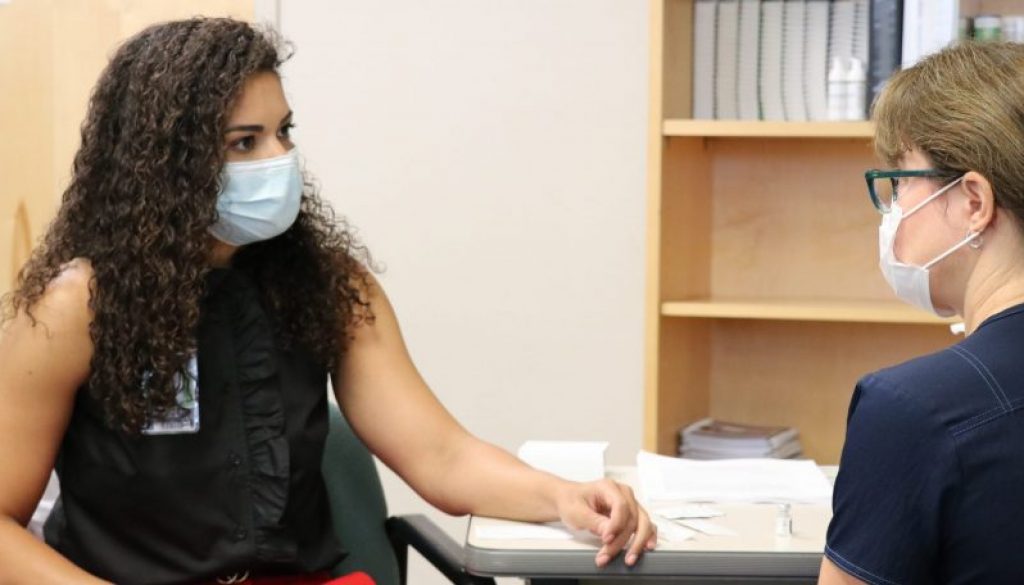What to know about the side effects of the COVID-19 vaccine
Post updated 10/13/2021 with more side effect information
Conway Medical Center is a part of the nationwide effort to protect people from COVID-19 by providing vaccinations for all members of our community. Our frontline hospital employees continue to help those affected by this disease as COVID-19 cases increase throughout our area.
Vaccinations remain one of the best ways to protect yourself, your neighbors and your loved ones from COVID-19.
But in the meantime, there is one question on everyone’s minds…
What can I expect after I get the vaccine?
Although there are some people who have not experienced any side effects, there are others who have described symptoms similar to those experienced during a hangover or the flu. For those that do have side effects, they tend to only last for a few days.
The CDC tells us to anticipate that when you have the vaccine it could affect your ability to do day-to-day activities.
Some people are questioning whether they should get the vaccine either from a fear of side effects or from mistrust due to confusion and disinformation largely distributed through social media.
Dr. Stephen Brady, Director of Cardiology at CMC fully supports the COVID-19 vaccination.
“There is always the risk of side effects with any vaccine,” said Dr. Brady. “But I believe in the science. I like the data. And I think it’s important that people get their vaccination when it’s time to protect the people around them that they care about.”
Can You Get COVID-19 From the Vaccine?
It’s important to understand that you can NOT get COVID-19 from the vaccine. The side effects you may experience are not COVID related. What they are is a sign that your immune system is working and building defenses against the illness. It will take time for your body to build up that protection and if you receive a vaccine that requires 2 shots, it could take a couple of weeks after your second shot for that immunity to be complete.
So, What Are the Most Common Side Effects of the COVID Vaccine?
When you get the vaccine, you may experience:
- Soreness and swelling in your arm around the injection area
- Fever
- Chills
- Tiredness and fatigue
- Muscle pain
- Headaches
These are similar to what you might experience after having a flu shot.
Relief for the Common Side Effects of the COVID-19 Vaccine
If you are experiencing any of these side effects, there are some things that you can do to make yourself more comfortable. An over-the-counter medication, such as ibuprofen or acetaminophen, can be helpful in reducing inflammation and pain.
A clean, cool, wet washcloth applied to the site of the injection can help reduce some irritation. If you experience a fever, remember to drink plenty of fluids and dress lightly to make yourself more comfortable.
Can You Experience Tinnitus or Ringing in the Ears After a COVID Vaccine?
While studies cannot demonstrate a clear connection, it appears that tinnitus could be a very rare side effect of the vaccine. However, research is ongoing and there is currently no definitive information.
Tinnitus is a condition where you hear a ringing or buzzing sound in the ear that does not come from an outside source.
Adverse reactions to vaccinations are reported in the Centers for Disease Control’s Vaccine Adverse Event Reporting System (VAERS) database.
According to this database, out of 362 million vaccine doses, there were 9,166 cases where people had ringing in the ears after having the vaccine. This equates to roughly one incident per 40,000 vaccine doses.
However, it is still not clear if the tinnitus occurred as the result of the vaccine or if it was caused by something else, so researchers are still examining this correlation.
Can You Experience Heartburn or Acid Reflux After a COVID Vaccine?
Some have reported heartburn as a side effect after receiving a COVID vaccine, according to information from the American Journal of Medical Virology.
However, as in the case with tinnitus, it isn’t perfectly clear if heartburn occurred from the vaccine itself or as the result of something else.
When Should I Contact My Health Care Provider About Side Effects?
If you start noticing redness and tenderness around where you received the shot that increases after 24 hours, contact your healthcare provider. Also, seek medical attention if any of your side effects become worrisome or do not seem to be going away after a few days.
Serious allergic reactions are rare and typically occur within the first 15 minutes of injection. If you have known allergies, are prone to allergic reactions, or have medical conditions you feel could make you susceptible to an adverse reaction, consult your family physician prior to receiving a vaccination.
Conway Medical Center Has the Reliable COVID-19 Information You Need
Too often, well-meaning friends and family members can spread misinformation on social media. With all the information out there, it can be difficult to determine the difference between fact and fiction.
Don’t worry—we have the answers you need.
Our site has an extensive library of information on COVID-19 that covers some of your most frequently asked questions.
Remember that being well-informed is key to remaining healthy. We encourage you to contact your health care provider if you have any questions or concerns about the COVID vaccine



